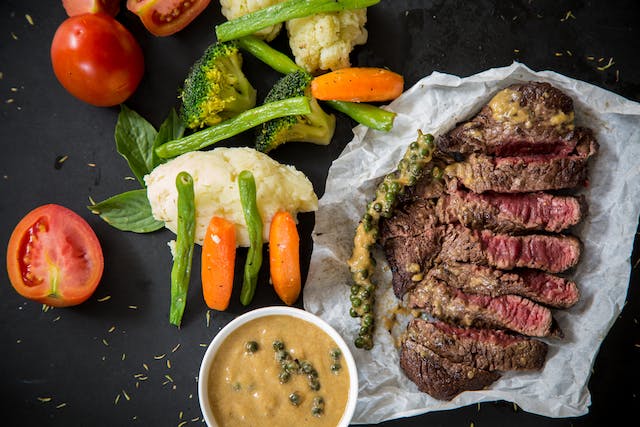The Ultimate Guide to Accelerated Weight Loss and Well-Being

1. Setting Realistic Goals and Understanding Motivation for Weight loss
Before diving into the 21 fastest ways to lose weight, it’s imperative to set realistic goals and understand your motivation. Whether your aim is improved health, increased energy levels, or enhanced self-confidence, identifying your motivation is crucial for staying focused and committed throughout the weight-loss journey.
Table of Contents
Create a Balanced Nutrition Plan for Weight Loss
Developing a well-rounded and sustainable nutrition plan is fundamental to achieving weight-loss goals. Prioritize a well-rounded eating plan that encompasses a diverse array of nutrition-packed foods, including fruits, vegetables, lean proteins, whole grains, and wholesome fats.
Avoid extreme diets and consult with a registered dietitian for a personalized plan aligning with your goals and lifestyle.
Incorporate Regular Physical Activity
Exercise is pivotal in any weight-loss journey. Choose activities you enjoy for sustainability, including cardiovascular exercises, strength training, and flexibility exercises. Start with activities matching your fitness level and gradually intensify.
Stay Consistent and Patient
Sustained consistency plays a pivotal role in both attaining and upholding weight-loss goals. Recognize that results may not be immediate, celebrate small victories, and understand setbacks are part of the process. Sustainable weight loss is a gradual journey requiring commitment and time.
Prioritize Adequate Sleep

Sufficient sleep is frequently underestimated yet vital for effective weight management. Sleep deprivation can disturb hormonal equilibrium, resulting in heightened cravings and diminished energy levels. Strive for 7-9 hours of quality sleep every night to bolster your weight-loss endeavours
Manage Stress Effectively
Stress can impact weight management. Develop effective stress management strategies such as mindfulness or meditation to avoid emotional eating and unhealthy behaviours hindering weight loss.
Seek Support
Having a support system enhances the weight-loss journey. Share goals with friends and family, join a community or group, and consider professional support from healthcare providers or fitness trainers for personalized guidance.
2. The Importance of Staying Hydrated
Understanding Thirst vs. Hunger
Maintaining adequate hydration is fundamental for overall well-being and weight management. Consistently drinking water helps prevent misinterpreting thirst as hunger, reducing unnecessary calorie consumption.
Get the best of JAVA COFEE THAT WILL HELP YOU STAY BALANCE ALL DAY

Thirst Signals and Caloric Misinterpretation
Staying well-hydrated helps regulate hunger cues, making it easier to distinguish between genuine hunger and the need for fluids. Hydration also supports optimal metabolism, aids digestion, enhances energy levels, and nurtures healthy skin.
Individualized Hydration Needs

The hydration requirements for each person are unique and influenced by factors such as age, activity level, and the prevailing climate. Listen to your body’s signals and make water consumption a regular habit to ensure you meet your fluid requirements.
Diversify Hydration with Flavored Options
Integrate refreshing beverages such as herbal teas and fruit-infused water to introduce a diverse range of flavours and variety into your hydration routine.
Maintain consistent hydration throughout the day to support your body’s functions and overall health.
3. Elevate Your Health with Protein Prioritization

The Power of Lean Proteins
In the journey to a healthier lifestyle, prioritizing protein intake is pivotal. Lean proteins aid in muscle retention, act as metabolic boosters, and contribute to a more efficient calorie-burning process.
Unveiling Muscle Retention
Incorporating lean protein is essential for maintaining and building muscle mass. Proteins are the building blocks of muscles, assisting in repair and regeneration and ensuring muscle mass retention during weight loss.
Metabolic Ignition
Protein’s metabolic-boosting properties contribute to a higher overall calorie expenditure, indirectly supporting weight management. Diversify protein sources, including poultry, fish, eggs, beans, and tofu, to ensure a spectrum of essential amino acids and nutrients.
Balancing Act and Meal Planning

Achieve the right balance of protein through thoughtful meal planning. Consult with a nutritionist to tailor protein intake based on factors like activity level, age, and dietary preferences.
4. Mastering Portion Control for a Healthier You
Mastering portion control is a crucial aspect of maintaining a healthy lifestyle. It involves being mindful of the quantity of food you eat to manage your weight, support overall health, and prevent overeating. Here are some tips to help you master portion control for a healthier lifestyle:
Understanding Serving Sizes: Develop the skill of reading and interpreting nutritional labels to grasp the recommended serving sizes for various foods. This knowledge empowers you to make informed choices about portion control, a key component of successful weight loss.
Optimizing Plate and Bowl Sizes: Explore the psychological impact of using smaller plates and bowls on portion control. Research suggests that this visual trickery can positively influence eating habits, aiding in weight management by naturally moderating the amount of food consumed.
Listening to Hunger and Fullness Signals: Cultivate awareness of your body’s hunger and fullness cues. Mindful eating involves savouring each bite, allowing you to better gauge when you’ve had enough. This practice not only supports weight loss but also fosters a healthier relationship with food.
Strategic Plate Division: Implement the plate division strategy, such as the MyPlate model, to ensure a balanced and nutritionally rich diet. This method guides you in allocating appropriate portions of vegetables, lean proteins, and whole grains, facilitating weight loss through a well-rounded approach to eating.
Mindful Eating Practices: Grasp the concept of mindful eating by eliminating distractions during meals. Engaging your senses in the eating process aids in recognizing satiety, preventing overeating, and fostering a mindful approach to weight management.
Precision in Measurement: Develop precision in portion control through the use of measuring cups and a food scale. This educational approach provides tangible insights into portion sizes, allowing you to better manage calorie intake and work towards your weight loss goals.
Strategic Snack Portioning: Learn the art of pre-portioning snacks to avoid mindless consumption. This tactic not only aids in weight loss by controlling overall caloric intake but also supports healthier snack choices.
Hydration for Appetite Control: Understand the role of hydration in appetite control. Drinking water before meals contributes to a feeling of fullness, helping you consume smaller, more controlled portions and facilitating weight loss.
Balancing Indulgence and Moderation: Embrace the concept of moderation to enjoy favourite foods within the context of a balanced diet. This educational shift promotes sustainability in weight loss efforts, allowing for occasional treats without derailing progress.
Strategic Meal Planning: Explore the educational benefits of meal planning in weight loss. This proactive approach helps you make thoughtful food choices, reducing the likelihood of impulsive decisions that may hinder your weight loss journey.
Calorie Awareness for High-Density Foods: Develop an awareness of the calorie density of foods, especially those that are high in calories. This knowledge allows you to enjoy these items in smaller, controlled portions, contributing to effective weight management.
Professional Guidance for Tailored Advice: Recognize the value of seeking professional guidance from a registered dietitian or nutritionist. These experts can provide personalized educational insights, creating a roadmap for successful and sustainable weight loss based on your unique needs and goals.
The Art of Mindful Eating
The art of mindful eating is a practice that involves paying full attention to the experience of eating, savouring each bite, and being fully present in the moment. It goes beyond simply choosing healthy foods; it’s about cultivating a deep awareness of the entire eating process, from the decision to eat to the sensations and emotions experienced during and after a meal. Here are key principles and aspects of the art of mindful eating:
Present Moment Awareness: Mindful eating emphasizes being fully present during meals. This means putting away distractions like smartphones, turning off the TV, and focusing on the act of eating.
Savouring the Flavors: Rather than rushing through meals, mindful eating encourages individuals to savour the taste, texture, and aroma of each bite. This heightened sensory awareness can enhance the overall dining experience.
Eating with Intention: Mindful eaters approach meals with intention and purpose. They are aware of their hunger and make conscious choices about what to eat, how much to eat, and when to stop.
Recognizing Hunger and Fullness: Mindful eating involves tuning in to the body’s hunger and fullness signals. This awareness helps individuals eat when hungry and stop when satisfied, preventing overeating or undereating.
Non-Judgmental Observation: Mindful eating encourages a non-judgmental attitude toward food and eating. Instead of labelling foods as “good” or “bad,” individuals observe their choices with curiosity and without self-criticism.
Understanding Emotional Eating: Mindful eating involves recognizing and understanding emotional triggers for eating. Rather than using food to cope with emotions, individuals learn alternative ways to address stress, boredom, or other emotional states.
Gratitude for Food: Cultivating a sense of gratitude for the food on your plate is a part of mindful eating. This involves acknowledging the effort that went into producing and preparing the meal and fostering a positive and appreciative relationship with food.
Eating for Nourishment: Mindful eating focuses on nourishing the body rather than simply consuming calories. This involves choosing foods that provide sustenance and energy, promoting overall health and well-being.
Chewing and Digestion Awareness: Mindful eaters pay attention to the act of chewing and the process of digestion. Chewing food thoroughly not only aids digestion but also allows for greater awareness of the flavours and textures in each bite.
Listening to Body Cues: The practice involves listening to the body’s hunger and fullness cues. Understanding when the body needs nourishment and when it’s had enough helps maintain a healthy and balanced relationship with food.
Mindful Portion Control: Mindful eating includes being aware of portion sizes and eating in a way that respects the body’s needs. This can contribute to weight management and overall health.
Cultivating Mindful Habits Beyond Eating: Mindful eating is part of a broader mindfulness practice that extends beyond the dining table. It involves bringing mindfulness to other aspects of life, such as shopping for food, cooking, and being aware of the body’s needs throughout the day.
In essence, the art of mindful eating is about transforming the way you think about food and the act of eating. By fostering a mindful approach, individuals can develop a healthier and more positive relationship with food, leading to better overall well-being.
Small Plates, Big Impact
Opt for smaller plates to create a visual illusion of more substantial portions, promoting satisfaction with smaller, controlled servings. Tune into your body’s signals of hunger and fullness to guide your eating habits.
Navigating Portion Control Challenges
Strategically approach challenges in social settings by eating a small, balanced snack before events. Efficient meal planning and preparation are valuable tools in the portion control toolkit.
Portion Control as a Lifestyle
Understand that portion control is a conscious choice towards a healthier lifestyle, allowing you to savour the flavours of your favourite foods without guilt. Share goals with friends or family for support and accountability.
5. Nourishing Your Body with Whole Foods

Embracing Nutrient-Rich Choices
Whole foods, derived directly from nature, form the cornerstone of a balanced and wholesome diet. Incorporate fruits, vegetables, whole grains, and lean proteins into meals to enhance nutritional value and foster overall well-being.
Caloric Efficiency and Essential Nutrients
Caloric efficiency refers to the amount of energy (calories) derived from a given amount of food to meet the body’s energy needs. It’s a concept that considers how well the calories obtained from a particular food source contribute to meeting the body’s energy requirements and supporting various physiological functions.
In the context of a healthy diet, caloric efficiency becomes important because not all calories are created equal. Different macronutrients (carbohydrates, proteins, and fats) provide different amounts of energy, and the body may expend varying amounts of energy to digest and process these nutrients. For example:
- Proteins: The body expends more energy (calories) to digest and metabolize proteins compared to fats and carbohydrates. Additionally, proteins play a crucial role in muscle building and repair, making them an essential component of a balanced diet.
- Fats: While fats are more calorie-dense than proteins and carbohydrates, they are also an important source of energy. Healthy fats, such as those found in avocados, nuts, and olive oil, contribute to overall caloric efficiency and provide essential fatty acids necessary for various bodily functions.
- Carbohydrates: Carbohydrates are a primary energy source for the body. They are broken down into glucose, which is used for immediate energy or stored for later use. Whole grains, fruits, and vegetables are sources of carbohydrates that contribute to caloric efficiency.
Understanding caloric efficiency is crucial for maintaining a balanced diet that meets energy needs while providing essential nutrients. It emphasizes the quality of calories consumed rather than just focusing on the quantity.
Essential Nutrients:
Essential nutrients are compounds that the body cannot produce in sufficient quantities on its own and must obtain through the diet. These nutrients are critical for normal physiological function, growth, development, and overall well-being. There are several categories of essential nutrients, including:
- Essential Amino Acids (Proteins): These are the building blocks of proteins, and the body cannot produce all of them. Therefore, they must be obtained through the diet. Sources include meat, dairy, legumes, and certain grains.
- Essential Fatty Acids: Omega-3 and omega-6 fatty acids are examples of essential fats that the body needs for various functions, including cell structure and function. Sources include fatty fish, flaxseeds, chia seeds, and walnuts.
- Vitamins: Essential vitamins are organic compounds that play specific roles in metabolic processes, immune function, and overall health. Examples include vitamin C, vitamin D, and B vitamins. Fruits, vegetables, dairy, and fortified foods are good sources.
- Minerals: Essential minerals, such as calcium, iron, and potassium, are inorganic elements critical for various physiological functions, including bone health, oxygen transport, and fluid balance. Sources include dairy products, lean meats, nuts, and vegetables.
- Water: While not a nutrient in the traditional sense, water is essential for life. It plays a crucial role in hydration, digestion, temperature regulation, and nutrient transport.
Ensuring an adequate intake of essential nutrients is fundamental for preventing nutritional deficiencies and supporting overall health. A well-balanced diet that includes a variety of nutrient-dense foods is key to meeting the body’s requirements for essential nutrients.
Practical Tips for Incorporating Whole Foods
Seamlessly integrate whole foods into daily meals through meal preparation and choosing whole-food snacks. Making whole foods a substantial part of your diet sets the stage for a balanced and sustainable approach to nourishment.
Meal Prepping
Plan and prepare meals ahead of time, incorporating a variety of whole foods for a balanced nutritional profile. This not only saves time but also ensures you have convenient access to nutritious options, reducing the temptation to opt for less healthy alternatives.
Snack Smart
Choose whole-food snacks like fresh fruit, raw vegetables, or a handful of nuts. These snacks not only provide essential nutrients but also contribute to satiety, helping you maintain control over your overall calorie intake.
Explore Culinary Creativity
Experiment with different cooking methods and recipes that showcase the natural flavours of whole foods. By adding herbs, spices, and healthy condiments, you can enhance the taste of your meals without compromising on nutritional value.
Gradual Transitions
If transitioning to a whole-foods-based diet feels overwhelming, consider making gradual changes. Start by incorporating one or two whole foods into each meal and gradually increasing the variety over time. This approach allows your taste buds and habits to adapt.
Mindful Grocery Shopping
When grocery shopping, focus on the perimeter of the store where fresh produce, lean proteins, and whole grains are often located. Minimize the time spent in the aisles containing processed and packaged foods, which are typically higher in added sugars and preservatives.
Achieving Optimal Health Through Whole Foods
In your quest for optimal health and accelerated weight loss, whole foods take centre stage. These nutrient-dense choices not only contribute to your physical well-being but also support mental clarity and sustained energy levels.
Fruits: Nature’s Sweet Bounty
Rich in vitamins, minerals, and antioxidants, fruits serve as vibrant and flavorful allies on your health journey. Berries, citrus fruits, apples – each fruit contributes a unique array of nutrients supporting overall health and vitality.
Vegetables: Colorful Nutrient Powerhouses
Vegetables, with their kaleidoscope of colours, offer a diverse range of nutrients essential for optimal functioning. Leafy greens like spinach and kale provide abundant vitamins, while cruciferous vegetables such as broccoli and Brussels sprouts offer potent antioxidants.
Whole Grains: Sustaining Energy and Nutrients
Quinoa, brown rice, and oats, among other whole grains, are rich in fiber, providing sustained energy and supporting digestive health. Opting for whole grains over refined counterparts ensures the retention of valuable nutrients like fiber, B vitamins, and minerals.
Lean Proteins: Building Blocks for Health
Incorporating lean proteins into your diet is crucial for muscle health, immune function, and overall cellular maintenance. Skinless poultry, fish, legumes, and tofu provide high-quality protein without unnecessary saturated fats.
Caloric Efficiency and Essential Nutrients
Whole foods offer a unique advantage in their caloric efficiency. They provide essential nutrients without the added sugars, preservatives, and artificial additives often found in processed foods. This caloric density, combined with a wealth of vitamins, minerals, and antioxidants, allows you to nourish your body more effectively while maintaining a balance in your calorie intake.
Conclusion
In conclusion, the journey to accelerated weight loss and optimal well-being involves a holistic approach that incorporates realistic goal setting, balanced nutrition, regular physical activity, stress management, and the integration of whole foods into your diet.
By embracing these principles, you not only support your weight loss goals but also pave the way for a healthier and more fulfilling lifestyle.
Remember, it’s a journey, not a destination, and each positive step you take brings you closer to the vibrant, healthy life you aspire to achieve.



